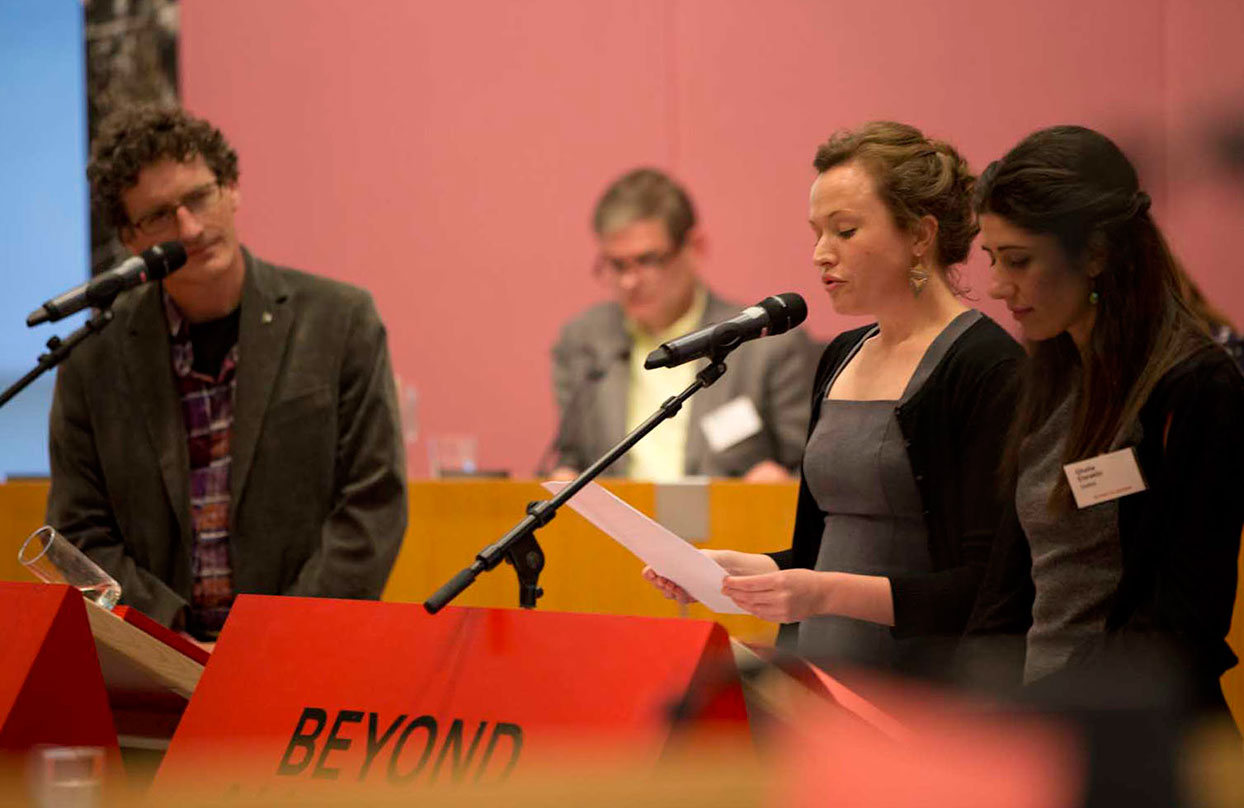Mapping the Deep State
August 19, 2014column,
The following text was developed on the occasion of the Beyond Allegories debate, for which 250 artists, politicians, union representatives, university professors, dramatists, representatives from refugee organisations and NGOs, journalists, and students gathered together for seven hours in Amsterdam’s City Council to discuss the role of art within governance, political mobilisation and action. This debate was organised by Ann Demeester (De Hallen | Frans Hals Museum), Carolien Gehrels (until recently Alderman for Art & Culture, PvdA / Labor Party Amsterdam) and the artists Hans van Houwelingen and Jonas Staal in an effort to forge new progressive alliances. The text will be part of the DVD-book Beyond Allegories, a collection of the resolutions and videos that resulted from the project, which will be published this year.

We, Dirk Poot (Pirate Party, the Netherlands) and design collective Foundland (Lauren Alexander and Ghalia Elsrakbi), have joined in the following three propositions:
1. Political Acknowledgement of the Deep State
The Deep State, otherwise known as the “State within the State”, refers to those activities of political forces that take place outside of public, civil control. The Deep State consists of dangerous entanglements of states and corporations for whose actions the state cannot take responsibility, thus not only mixing public interests with private, corporate interests but in essence rendering democracy powerless. The operations of secret services, such as: the National Security Agency (NSA) of the United States (to which the secret services of the Netherlands provide data as well) are financed through so-called “black budgets”, which remain undisclosed, even to political representatives; social media such as Facebook hand over private data to corporations and secret services; mercenary organisations have built multi-billion dollar empires by waging wars on behalf of states without rules, oversight or accountability; the European Union (EU) has outsourced its border security to a myriad of mercenary armies and public-private partnership; and the EU finances weaponised drone development as well as civil surveillance systems under the name of “research” thereby subsidizing technologies without parliamentary discussion on military spending. Society needs to acknowledge the fact that the realm of power today is situated between the spheres of politics and corporations: the realm of the “modern deep state”.
2. Extrapolating the Deep State
If the Deep State, this being the entanglement between corporate and state interests outside of public control, is increasingly defining our world, then it is a political responsibility to make its structures, interests and effects visible: to, in fact, make the Deep State visible. In essence this means extrapolating the effects of the Deep State, to extend understanding of its existence and its impact. This should be initiated by a coalition of progressive political forces and creative forces that can make the structure of the Deep State visible and help to imagine a different politics, a politics that is part of – and controllable by – the public sphere. We thus propose to imagine the Deep State both through this resolution as well as through a dystopian storytelling of what our future might look like if we do not put a halt to the increasing power of the Deep State, hoping to spread awareness of the strengthening foothold of corporate interference and its consequences in our daily life in Europe and beyond.
3. Questioning the Deep State
Transparency, accountability and a delicate power balance between state and citizens form the foundation of democracy. We must question whether the emergent structure of the Deep State is compatible with our democratic principles. If deemed an undesirable situation, we must question if and how this unaccountable power can be brought back within the realm of democratic structures and if any democratic principles have failed or have been circumvented. We must also question if the existence of so-called “revolving doors” between politics and corporations have been instrumental in this shift of power towards public-private partnerships. We must furthermore question whether the public’s interests are truly served and protected with the growing acceptance of lobbyists as preferred partners in the drafting of law and international treaties.
All other video registrations of Beyond Allegories including the Introduction and Epilogue can be found on this page: www.vimeo.com.
Essay by E. C. Feiss, On Beyond Allegories
Salima Belhaj & Wunderbaum, Plea for a Free Zone
Mariko Peters, Metahaven & Jonas Staal, Towards an Extra-Parliamentary Democracy!
Yoonis Osman Nuur & Ahmet Öğüt, Political Representation Beyond Citizenship
Carolien Gehrels & Hans van Houwelingen, The Creative City: A Blessing for Administration but a Curse for the Arts
Ron Meyer & Matthijs de Bruijne, De Democratisering van de Kunst
Ron Meyer & Matthijs de Bruijne, Democratising the Arts
Dirk Poot has been a spokesperson for the Dutch Pirate Party since 2012 and has as a candidate MP actively taken part in the Dutch parliamentary elections of 2010 and 2012 and the 2014 elections for European Parliament. The Pirate Party supports a free Internet as a condition for an open and democratic society, as a source of inspiration and knowledge, and above all as a source of critical information. See further: www.piratenpartij.nl.
Foundland Collective (Ghalia Elsrakbi, SYR and Lauren Alexander, ZAR) is a design, research and art practice, based between Cairo, Egypt and Amsterdam, the Netherlands. Since its inception in 2009, the collective have focused on critical analysis of topics related to political and place branding, manifesting their speculations and ideas through visual and written manifestations, exhibitions and publications. See further: www.foundland.info.